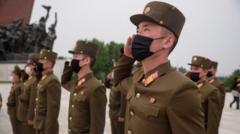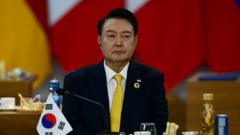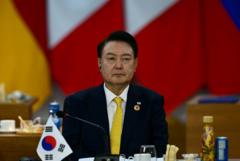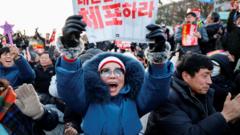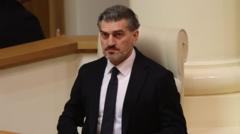As calls for impeachment intensify, President Yoon Suk Yeol claims his martial law enactment was necessary to safeguard democracy, while facing significant political backlash and legal challenges.
South Korea's Yoon Suk Yeol Resists Impeachment Calls Amid Martial Law Controversy
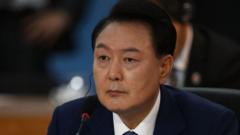
South Korea's Yoon Suk Yeol Resists Impeachment Calls Amid Martial Law Controversy
South Korean President Yoon Suk Yeol remains defiant, refusing to resign despite rising pressures and accusations following his controversial declaration of martial law.
Embattled South Korean President Yoon Suk Yeol has issued a defense of his controversial martial law declaration made last week, which he asserts was a necessary legal measure to safeguard democracy in the face of what he describes as a "parliamentary dictatorship" led by opposition forces. In a televised address on Thursday, Yoon insisted that his actions were to prevent a potential collapse of democratic governance.
Despite facing increasing calls for his resignation and impeachment, Yoon expressed his determination to remain in office, stating, "I will stand firm whether I'm impeached or investigated. I will fight to the end." His administration is currently embroiled in investigations over insurrection allegations, prompting travel restrictions imposed on several of his associates. Yoon countered accusations of insurrection by alleging that his rivals are engaging in "false incitement" aimed at ousting him from power.
Referencing his earlier apologies, Yoon reiterated his stance that his actions were aimed at protecting public welfare and democracy from what he perceives as a dangerous opposition. He acknowledged, however, his commitment to facing his "legal and political responsibilities."
Last weekend, an impeachment attempt by opposition lawmakers was thwarted when members from Yoon's ruling party chose to abstain from the vote. Nevertheless, opposition leaders plan to pursue another impeachment vote this coming weekend, pledging to continue with weekly attempts until they secure Yoon's removal. Yoon's party had initially hoped to negotiate an early resignation from the president to mitigate the political crisis, but with party leader Han Dong Hoon stating on television that Yoon's departure is unlikely, internal divisions seem to be emerging.
Should the South Korean parliament successfully pass an impeachment bill, a trial would occur at the constitutional court, where a two-thirds majority would be required to remove Yoon from office completely. Since the opposition achieved a significant victory in April's general elections, Yoon's government has struggled to enact legislative priorities, predominantly resorting to vetoing opposition-proposed bills.



